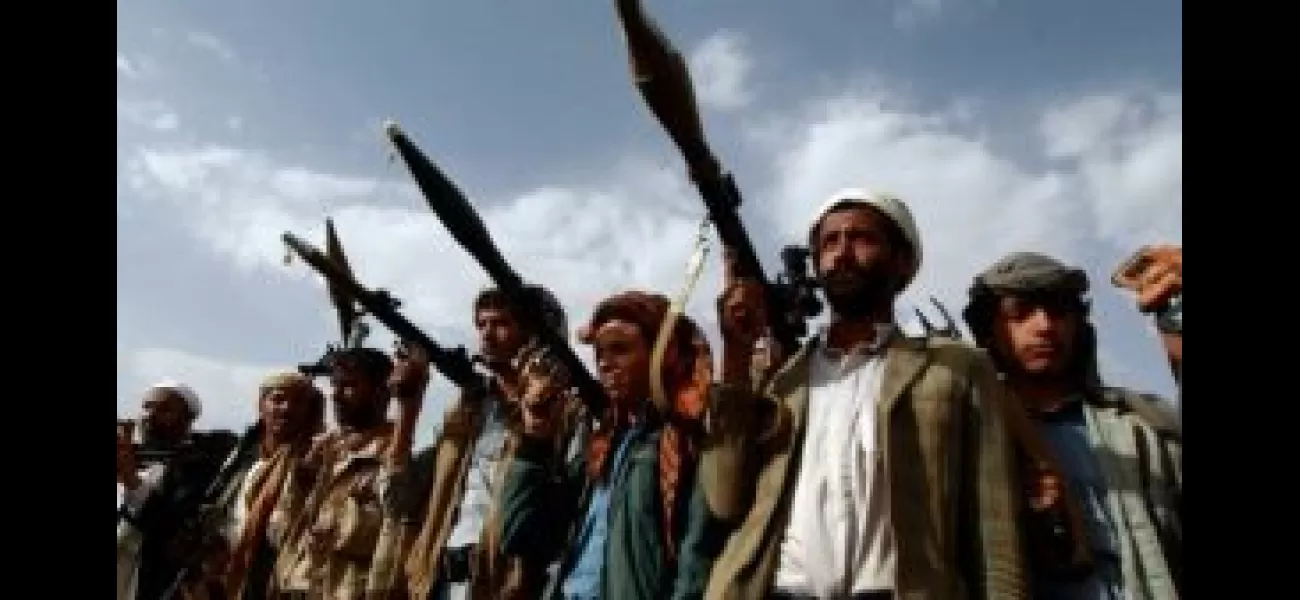Houthi rebels have arrested 9 UN employees in a surprise crackdown, according to officials.
Nine UN employees from Yemen have been detained by Houthi rebels, potentially due to financial pressure and airstrikes from a US-led coalition.
June 7th 2024.

In the bustling city of Dubai, a troubling situation has arisen. Yemeni employees of United Nations agencies have been detained by the Houthi rebels in Yemen. The circumstances surrounding their detainment remain unclear, but what is certain is that these individuals are facing a difficult and uncertain fate. This comes at a time when the Houthis are facing financial pressure and airstrikes from a US-led coalition, adding to the already tense atmosphere in the region.
It's not just UN employees who have been targeted by the rebels. Other aid workers are also believed to have been taken into custody. The timing of these detentions is especially concerning as the Houthis have been ramping up their aggressive actions, including targeting ships in the Red Sea corridor due to the ongoing conflict between Israel and Hamas in the Gaza Strip. While their actions have gained international attention, they have simultaneously been cracking down on dissent within their own territory, even going as far as sentencing 44 people to death.
Regional officials, who have asked to remain anonymous, have confirmed the detentions of UN employees. These include staff members from various agencies such as the human rights agency, development program, World Food Program, and the office of the special envoy. The wife of one of the detained individuals has also been taken into custody. The UN has yet to comment on the situation.
The Mayyun Organization for Human Rights has also identified the UN employees who have been detained by the Houthis. They have also named other aid groups whose employees have been taken into custody in four of the provinces controlled by the rebels. These groups have not yet acknowledged the detentions. In a statement, the organization strongly condemned these actions, stating that they are a violation of international law and are being used as a means to gain political and economic advantages.
The Houthis have not made any official statements regarding the detentions, but they have planned for mass demonstrations after their noon prayers on Friday. This is when Houthi officials typically address their actions. The reasons behind these detentions are still unclear, but it is believed that it may be related to the rebels' struggle to maintain their economy in the areas they control. This was further highlighted by their recent introduction of a new coin into the Yemeni currency, which was met with criticism from both the exiled government in Aden and other nations who accused the Houthis of counterfeiting. In response, Aden authorities have demanded that all banks relocate their headquarters to Aden.
The situation in Yemen is precarious, and tensions are high. Journalist Mohammed Ali Thamer has warned of the potential for internal conflict and a complete economic collapse if these issues are not addressed. In a separate report, Bloomberg stated that the US is planning to increase economic pressure on the Houthis by blocking their sources of revenue, including a planned payment of USD 1.5 billion from Saudi Arabia to cover salaries for government employees in rebel-held territory.
The ongoing war in Yemen has already claimed the lives of over 150,000 people, and has created one of the world's worst humanitarian crises, with tens of thousands more dying from famine and disease. The Houthis' attacks on shipping have diverted attention from their problems at home and the stalemate in the war. However, they have also suffered increasing casualties and damage from airstrikes conducted by the US-led coalition.
The Houthis have a history of human rights abuses, with thousands of people being imprisoned by the rebels during the war. An investigation by the AP revealed horrific treatment of detainees, including being burned with acid, being suspended by their wrists for weeks, and being beaten with batons. In addition, the Houthis have been accused of using child soldiers and placing indiscriminate mines in the conflict.
It's important to note that the Houthis are a minority group in Yemen, belonging to the Shiite Zaydi sect of Islam. They ruled northern Yemen for a thousand years until 1962. Their actions and the ongoing war have brought devastation and suffering to the people of Yemen, and it's a situation that shows no signs of improving anytime soon.
It's not just UN employees who have been targeted by the rebels. Other aid workers are also believed to have been taken into custody. The timing of these detentions is especially concerning as the Houthis have been ramping up their aggressive actions, including targeting ships in the Red Sea corridor due to the ongoing conflict between Israel and Hamas in the Gaza Strip. While their actions have gained international attention, they have simultaneously been cracking down on dissent within their own territory, even going as far as sentencing 44 people to death.
Regional officials, who have asked to remain anonymous, have confirmed the detentions of UN employees. These include staff members from various agencies such as the human rights agency, development program, World Food Program, and the office of the special envoy. The wife of one of the detained individuals has also been taken into custody. The UN has yet to comment on the situation.
The Mayyun Organization for Human Rights has also identified the UN employees who have been detained by the Houthis. They have also named other aid groups whose employees have been taken into custody in four of the provinces controlled by the rebels. These groups have not yet acknowledged the detentions. In a statement, the organization strongly condemned these actions, stating that they are a violation of international law and are being used as a means to gain political and economic advantages.
The Houthis have not made any official statements regarding the detentions, but they have planned for mass demonstrations after their noon prayers on Friday. This is when Houthi officials typically address their actions. The reasons behind these detentions are still unclear, but it is believed that it may be related to the rebels' struggle to maintain their economy in the areas they control. This was further highlighted by their recent introduction of a new coin into the Yemeni currency, which was met with criticism from both the exiled government in Aden and other nations who accused the Houthis of counterfeiting. In response, Aden authorities have demanded that all banks relocate their headquarters to Aden.
The situation in Yemen is precarious, and tensions are high. Journalist Mohammed Ali Thamer has warned of the potential for internal conflict and a complete economic collapse if these issues are not addressed. In a separate report, Bloomberg stated that the US is planning to increase economic pressure on the Houthis by blocking their sources of revenue, including a planned payment of USD 1.5 billion from Saudi Arabia to cover salaries for government employees in rebel-held territory.
The ongoing war in Yemen has already claimed the lives of over 150,000 people, and has created one of the world's worst humanitarian crises, with tens of thousands more dying from famine and disease. The Houthis' attacks on shipping have diverted attention from their problems at home and the stalemate in the war. However, they have also suffered increasing casualties and damage from airstrikes conducted by the US-led coalition.
The Houthis have a history of human rights abuses, with thousands of people being imprisoned by the rebels during the war. An investigation by the AP revealed horrific treatment of detainees, including being burned with acid, being suspended by their wrists for weeks, and being beaten with batons. In addition, the Houthis have been accused of using child soldiers and placing indiscriminate mines in the conflict.
It's important to note that the Houthis are a minority group in Yemen, belonging to the Shiite Zaydi sect of Islam. They ruled northern Yemen for a thousand years until 1962. Their actions and the ongoing war have brought devastation and suffering to the people of Yemen, and it's a situation that shows no signs of improving anytime soon.
[This article has been trending online recently and has been generated with AI. Your feed is customized.]
[Generative AI is experimental.]
0
0
Submit Comment





